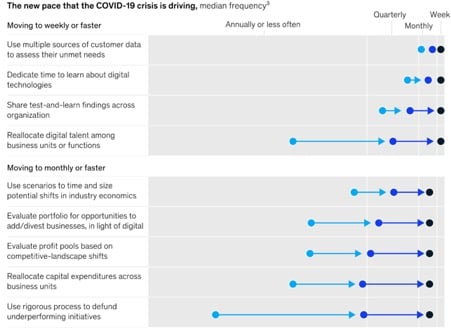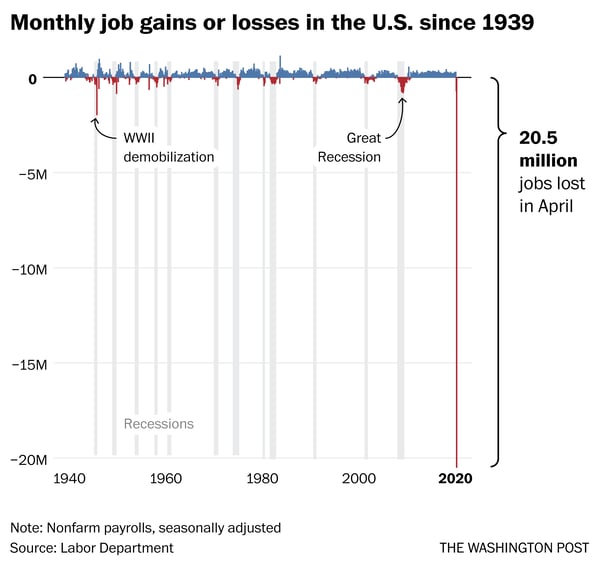
Does it feel as if you are living through a historical pivot? What will "normal" look like over the next few years?
For those of us who still have employment, work and living have blurred. Essential workers operate in restricted zones that emphasise safety and social distancing. The changes from the displacement of entire industries like tourism, travel and hospitality will ripple through lives and economies for years. Predictions about how things will turn out are speculative – we simply don’t know what will come, especially if the virus recurs in waves and a vaccine takes years to develop and disseminate.
That said, three broad phases seem obvious. Most of the world remains in the crisis phase, which is defined by radical social restriction, economic decline and scrambling responses. Companies conserve cash, shed costs and people, and try to survive.
The thawing phase is starting to occur in various places across the globe as governments and companies cautiously encourage people to return to work and production begins to start up. Outside of a few flush tech firms most companies remain extremely cost-conscious as they discover what is left of their customers, industries and operating models.
The resolution phase will begin with an enormous amount of experimentation before we consolidate around a ‘new normal’. What will the world of work evolve into for a pandemic shocked world? We don’t know, but we believe it will be defined by the acceleration of existing trends and some new priorities.
So, our speculations are:
1. The flexible workplace has arrived
After years of noise about paperless offices, virtual meetings and remote working it suddenly came true. In a matter of weeks firms jumped to new ways of working – without change plans, Project Management Offices (PMOs) or consultation. Right now companies are considering not just how to safely bring back employees but whether they need to come back at all. The world has had a crash course in working from home. For example, Weta Digital in New Zealand shifted 1,500 crew to a work-from-home model in just 72 hours and still met all of its project deadlines.
Not only is it do-able, but preferable, as companies consider the benefits of losing expensive office real estate and meeting employee wants. David Kenny, the chief executive at Manhattan research company Nielsen, said “I have done an about-face on this” and is converting its New York offices to team meeting spaces where workers gather once or twice a week.

2. Looser Management
Managers have also had to trust staff more and stop obsessing about face-time. Greater employee autonomy and reduced supervisory oversight did not break companies. Embracing technologies that allow for co-ordination and communication and making data more available actually increases the chances for innovation and co-operative problem solving. Unleashed from hierarchical management processes, rules and permission hierarchies, employees have restructured supply chains, changed processes and reimagined workflows to make do.
Case in point: usage of virtual meeting platforms have skyrocketed since the beginning of the year. Microsoft Teams' daily active users surged from just over 20 million to 75 million as of the end of April. Meanwhile Zoom's daily participant numbers bolted from 10 million to 300 million in the same timeframe. These shifts in operational behaviour and the scale of change can't be ignored.
Management will have to accommodate greater employee autonomy, more porous organisational boundaries and process flexibility, or risk the firm fading into irrelevance.
3. Compassionate Leadership
Leadership - competent, caring and inclusive – is going to be worth more than strategy documents for the foreseeable future.
Around the world Jacinda Ardern has been held up as an example of decisive, competent and empathic, values-led leadership. The top leadership of some firms have led the way by halving or even stopping their own pay as a symbolic gesture to furloughed staff or those on reduced hours that they will share in the pain.
Employees emerging from lockdown will feel anxious, bereaved, dislocated, hopeful and tired. They’ll want leaders who connect with them and are committed to their welfare. Workplaces will take health and safety concerns (e.g. hygiene) much more seriously, but we expect a significant uplift of interest in helping staff lead stable, balanced lives. “In the past, programmes have tended to be ad hoc, but firms are coming to us to up-skill leaders to attend to staff wellbeing holistically: physically, emotionally and mentally”, notes Gaynor Parkin, CEO of wellbeing provider Umbrella.
4. Deeper Learning
One of the most remarkable developments of the global pandemic has been the flood of research into the virus, vaccines, tests, cures and trials. By any measure the amount of brain time devoted to Covid-19 is unprecedented: in a matter of months 115 vaccine candidates are in development:

https://www.nature.com/articles/d41573-020-00073-5
We think the world of work is going to be similar – firms will be innovating and changing to adapt to radically different contexts for some time. To keep up with, and lead, the changes coming will require dramatically increased development to frontline leaders. Firms will be competing on how fast they can learn and adapt.
We will also see the increasing deployment of AI tools and inputs into many processes and systems. Work will see humans and AIs working together much more – and workplaces need to help employees and leaders to adapt to even more technological engagement.
Psychologically safe workplaces that allow experimentation will become a competitive advantage – especially when paired with leaders who can make decisions under pressure and who can apply lessons learned quickly and dynamically. Leaders with broader experiences and more stable, curious psychological profiles will do better in this environment.
 https://www.mckinsey.com/featured-insights/coronavirus-leading-through-the-crisis/charting-the-path-to-the-next-normal
https://www.mckinsey.com/featured-insights/coronavirus-leading-through-the-crisis/charting-the-path-to-the-next-normal
5. Purposeful work-lives
The surge of sourdough making across the world “is a reflection of the value we feel in doing something nourishing and creative,” says Tamlin Conner, Professor of Psychology at the University of Otago. Many people have had time to reflect, to evaluate what is of value to them and to reprioritise the role of work in their lives. This will become even more salient as we see unemployment rise to levels never seen before (this data is for the USA):

In a world that seems to have become unanchored, scary, chaotic and directionless, those organisations who embody a purpose and behaviours that are of value to the community will do better. One research paper suggested that 9 out of 10 people would accept less money for more meaningful employment.
Winsborough's own engagement with the giant infrastructure project run by the Piritahi Alliance has shown the benefits to our workforce engagement of doing meaningful work (in our case, developing land to build homes for relatives, friends and community).
Photo credit: marvin-meyer-SYTO3xs06fU-unsplash
You can find a selection of Leadership Resources that the Winsborough team have put together to help you through the Covid-19 pandemic and beyond here
